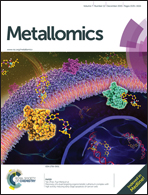Discovery of a dual-targeting organometallic ruthenium complex with high activity inducing early stage apoptosis of cancer cells†
Abstract
Ruthenium based complexes are promising antitumour candidates due to their lower toxicity and better water-solubility compared to the platinum antitumour complexes. An epidermal growth factor receptor (EGFR) has been found to be overexpressed in a large set of tumour cells. In this work, a series of organoruthenium complexes containing EGFR-inhibiting 4-anilinoquinazoline pharmacophores were synthesised and characterised. These complexes exhibited excellent inhibitory activity against EGFR and high affinity to interact with DNA via minor groove binding, featuring dual-targeting properties. In vitro screening demonstrated that the as-prepared ruthenium complexes are anti-proliferating towards a series of cancer cell lines, in particular the non-small-cell lung cancer cell line A549. Fluorescence-activated cell sorting analysis and fluorescence microscopy revealed that the most active complex 3 induced much more early-stage cell apoptosis than its cytotoxic arene ruthenium analogue and the EGFR-inhibiting 4-anilinoquinazolines, verifying the synergetic effect of the two mono-functional pharmacophores.


 Please wait while we load your content...
Please wait while we load your content...